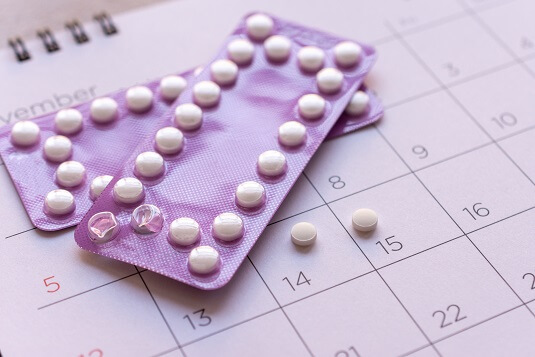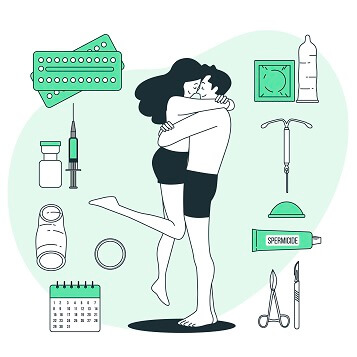Birth Control Side Effects
Side Effects of Birth Control Pills
The Impact of Birth Control
- The pill is a hormonal method of contraception for women, containing artificial oestrogen and progesterone that the ovaries naturally produce.
- The pill is taken daily, keeping progesterone and oestrogen levels steady, without a surge or decline in hormones, different phases of the menstrual cycle cannot be triggered.
- This article will briefly explain the short-term and long-term effects of birth control and its risks.

Short-Term Effects
- Generally, go away after 2-3 months
- Side effects can vary in severity
- Caused by the body undergoing adjustments to an increased amount of hormones
- Nausea
- Headaches
- Sore breasts
- Spotting between periods
Long-Term Effects
- Many long-term effects vary between individuals
- Weight gain
- Mood changes
- Missed periods
- Decreased libido
- Change in vaginal discharge
- Amenorrhea
If side effects continue to persist, talking to a healthcare professional will help to consider alternatives which may be easier for the body to adjust to.
Risks
- Birth control is safe for most women to use
- But it is important to discuss risk factors with a healthcare professional
- Blood clots
- High blood pressure
- Migraines
- Cardiovascular disease
- Unintended pregnancy
- Different demographics will have an increased likelihood of developing these risks
Who is More at Risk?
- Most people without medical conditions who do not smoke can take birth control until the menopause
- Pregnant women
- Women who smoke and are 35 or older
- Women that stopped smoking less than a year ago and are 35 or older
- Overweight women
- Those who take certain medicines
The pill may also not be right for you if you have (or have had):
- Blood clots in a vein
- Stroke
- Anyone in your close family having a blood clot under the age of 45
- A heart abnormality or heart disease, including high blood pressure
- Severe migraines
- Breast cancer
- Disease of the gallbladder or liver
- Diabetes with complications or diabetes for the past 20 years
Other Options
Hormonal Treatments
Living with these side effects is not ideal as they can impact your life depending on severity. Trying different types of pills can help you find one that is more suitable for your body. The progestogen-only pill is generally well-tolerated, and side effects are rare. Some include:
- Acne
- Breast tenderness and breast enlargement
- An increased or decreased sex drive
- Mood changes
- Headache and migraine
- Nausea or vomiting
- Small fluid-filled sacs (cysts) on your ovaries – these are usually harmless and disappear without treatment
- These usually only occur in the first few months
- This is a great option for those who cannot take oestrogen without persistent side effects but still wish to use a pill
There are other forms of hormonal treatment to try such as a contraceptive implant, contraceptive injection, contraceptive patch, or an IUS (intrauterine system or hormonal coil). Using an injection or patch will still require you to use them regularly while an implant or IUS does not but is more invasive by placing it within the body. Using any hormonal treatment will give similar side effects though.
Non-Hormonal Treatments
If you are only using birth control to act as a contraceptive, not to regulate periods, trying a non-hormonal treatment could help. They will not have the side effects of hormonal ones and will have similar levels of effectivity.
- Male condoms – placed on the penis before sexual activity, acting as a barrier
- Female condoms – placed inside the vagina before any contact with the penis
- Condoms offer protection against STDs and STIs unlike other contraception options
- Diaphragm – inserted into the vagina before sex to cover the cervix, used alongside spermicides that kill the sperm before fertilisation can occur
Sterilisation can also be an option but it is an irreversible process of tying the fallopian tubes so no eggs can be released and fertilised. It does not interfere with the body’s hormones and requires no upkeep. This procedure is usually only considered for women who do not wish to have anymore children, but you are more likely to be accepted for the operation if you are over 30.

Summary
- Birth control is suitable for the majority of the population
- As a hormonal treatment, it carries risks too so asking a healthcare professional about it is important
- Experiencing long-term side effects may make you consider other options of contraception such as alternative pills or non-hormonal treatments
- Which method works best for you depends on several factors, including your age, whether you smoke, your medical and family history, and any medicines you're taking
- Birth control is a great tool, so try out different options to find the one that suits you
Written by Shania Gangarh
I-Medics Ambassador













